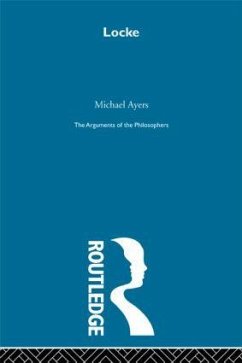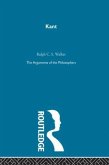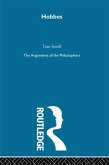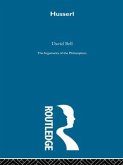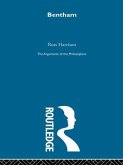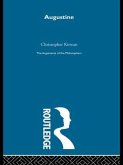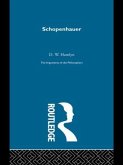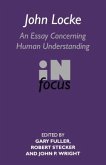Ayers
Locke - Arg Phil
Ayers
Locke - Arg Phil
- Broschiertes Buch
- Merkliste
- Auf die Merkliste
- Bewerten Bewerten
- Teilen
- Produkt teilen
- Produkterinnerung
- Produkterinnerung
First published in 1999. Routledge is an imprint of Taylor & Francis, an informa company.
Andere Kunden interessierten sich auch für
![Kant - Arg Phil Kant - Arg Phil]() WalkerKant - Arg Phil74,99 €
WalkerKant - Arg Phil74,99 €![Hobbes - Arg Phil Hobbes - Arg Phil]() Thomas SorellHobbes - Arg Phil62,99 €
Thomas SorellHobbes - Arg Phil62,99 €![Husserl - Arg Phil Husserl - Arg Phil]() BellHusserl - Arg Phil74,99 €
BellHusserl - Arg Phil74,99 €![Bentham - Arg Phil Bentham - Arg Phil]() HarrisonBentham - Arg Phil74,99 €
HarrisonBentham - Arg Phil74,99 €![Augustine Arg Phil Augustine Arg Phil]() KirwanAugustine Arg Phil74,99 €
KirwanAugustine Arg Phil74,99 €![Schopenhauer - Arg Phil Schopenhauer - Arg Phil]() HamlynSchopenhauer - Arg Phil74,99 €
HamlynSchopenhauer - Arg Phil74,99 €![John Locke John Locke]() Robert Stecker / John P. WrightJohn Locke56,99 €
Robert Stecker / John P. WrightJohn Locke56,99 €-
-
-
First published in 1999. Routledge is an imprint of Taylor & Francis, an informa company.
Hinweis: Dieser Artikel kann nur an eine deutsche Lieferadresse ausgeliefert werden.
Hinweis: Dieser Artikel kann nur an eine deutsche Lieferadresse ausgeliefert werden.
Produktdetails
- Produktdetails
- Verlag: Routledge
- Seitenzahl: 700
- Erscheinungstermin: 10. Oktober 2008
- Englisch
- Abmessung: 234mm x 156mm x 37mm
- Gewicht: 1045g
- ISBN-13: 9780415487634
- ISBN-10: 0415487633
- Artikelnr.: 26681805
- Herstellerkennzeichnung
- Libri GmbH
- Europaallee 1
- 36244 Bad Hersfeld
- gpsr@libri.de
- Verlag: Routledge
- Seitenzahl: 700
- Erscheinungstermin: 10. Oktober 2008
- Englisch
- Abmessung: 234mm x 156mm x 37mm
- Gewicht: 1045g
- ISBN-13: 9780415487634
- ISBN-10: 0415487633
- Artikelnr.: 26681805
- Herstellerkennzeichnung
- Libri GmbH
- Europaallee 1
- 36244 Bad Hersfeld
- gpsr@libri.de
Michael Ayers
VOLUME I EPISTEMOLOGY Introduction PART I IDEAS 1 Introduction to Part I 2
Ideas and compositionalism in traditional logic 3 Ideas and epistemology
before Locke 4 Simple and complex ideas 5 Ideas as images 6 Ideas as
intentional acts and ideas as intentional objects 7 Ideas as natural signs
8 Ideas: a summary 9 Reflections on the structure of thought PART II
KNOWLEDGE AND BELIEF 10 Introduction to Part II 11 The degrees of knowledge
and the role of method 12 Other divisions of knowledge 13 Probability and
the nature of 'assent' 14 The grounds of probability 15 Reflections on the
definition of knowledge 16 Belief and, rationality PART III PERCEPTUAL
KNOWLEDGE 17 Introduction to Part III 18 The authority and limits of
'sensitive knowledge' 19 Does perceptual knowledge have independent
authority? 20 Does perceptual knowledge have a firm boundary? 21 The scope
of perceptual knowledge 22 Two modern approaches to sensation 23 Private
language and secondary qualities PART IV PARTICULARS, UNIVERSALS AND
INTUITIVE KNOWLEDGE 24 Introduction to Part IV 25 Locke's arguments on
space and time in context 26 Thought about particulars 27 Locke's theory of
universal knowledge in context 28 Abstraction and the ideal of precision 29
Intuition and innate knowledge 30 Locke on meaning and some modern
criticisms 31 Reflections on understanding and imagination 32 Necessity,
reason and language 33 Conclusions of Volume I VOLUME II ONTOLOGY
Introduction PART I SUBSTANCE AND MODE 1 Introduction to Part I 2
Substance, essence and accidents before Locke 3 Our complex ideas of
substances and the idea of substance in general 4 Substance and real
essence, matter and spirit, and the obscurity and confusion of the idea of
substance 5 Substance, mode and the argument from language 6 Species and
their names in the corpuscularian world 7 Are there real species? 8 Locke
on the difference between substances and modes 9 Reflections on the notion
of substance PART II GOD, NATURE AND THE LAW OF NATURE 10 Introduction to
Part II 11 Forms of mechanism before Locke 12 The form of Locke's mechanism
13 Reflections on rationalism, empiricism and mechanism 14 The existence of
God 15 The Law of Nature and human freedom 16 Reflections on Locke's ethics
PART III IDENTITY 17 Introduction to Part III 18 Locke on 'masses of
matter' 19 Locke on living things 20 Forms of material unity 21 Artificial
and other problematic objects 22 Personal identity before the Essay 23
Locke's theory of personal identity 24 Contemporary reactions to Locke's
theory 25 Neo-Lockean and anti-Lockean theories of personal identity in
analytic philosophy 26 Conclusions of Volume II
Ideas and compositionalism in traditional logic 3 Ideas and epistemology
before Locke 4 Simple and complex ideas 5 Ideas as images 6 Ideas as
intentional acts and ideas as intentional objects 7 Ideas as natural signs
8 Ideas: a summary 9 Reflections on the structure of thought PART II
KNOWLEDGE AND BELIEF 10 Introduction to Part II 11 The degrees of knowledge
and the role of method 12 Other divisions of knowledge 13 Probability and
the nature of 'assent' 14 The grounds of probability 15 Reflections on the
definition of knowledge 16 Belief and, rationality PART III PERCEPTUAL
KNOWLEDGE 17 Introduction to Part III 18 The authority and limits of
'sensitive knowledge' 19 Does perceptual knowledge have independent
authority? 20 Does perceptual knowledge have a firm boundary? 21 The scope
of perceptual knowledge 22 Two modern approaches to sensation 23 Private
language and secondary qualities PART IV PARTICULARS, UNIVERSALS AND
INTUITIVE KNOWLEDGE 24 Introduction to Part IV 25 Locke's arguments on
space and time in context 26 Thought about particulars 27 Locke's theory of
universal knowledge in context 28 Abstraction and the ideal of precision 29
Intuition and innate knowledge 30 Locke on meaning and some modern
criticisms 31 Reflections on understanding and imagination 32 Necessity,
reason and language 33 Conclusions of Volume I VOLUME II ONTOLOGY
Introduction PART I SUBSTANCE AND MODE 1 Introduction to Part I 2
Substance, essence and accidents before Locke 3 Our complex ideas of
substances and the idea of substance in general 4 Substance and real
essence, matter and spirit, and the obscurity and confusion of the idea of
substance 5 Substance, mode and the argument from language 6 Species and
their names in the corpuscularian world 7 Are there real species? 8 Locke
on the difference between substances and modes 9 Reflections on the notion
of substance PART II GOD, NATURE AND THE LAW OF NATURE 10 Introduction to
Part II 11 Forms of mechanism before Locke 12 The form of Locke's mechanism
13 Reflections on rationalism, empiricism and mechanism 14 The existence of
God 15 The Law of Nature and human freedom 16 Reflections on Locke's ethics
PART III IDENTITY 17 Introduction to Part III 18 Locke on 'masses of
matter' 19 Locke on living things 20 Forms of material unity 21 Artificial
and other problematic objects 22 Personal identity before the Essay 23
Locke's theory of personal identity 24 Contemporary reactions to Locke's
theory 25 Neo-Lockean and anti-Lockean theories of personal identity in
analytic philosophy 26 Conclusions of Volume II
VOLUME I EPISTEMOLOGY Introduction PART I IDEAS 1 Introduction to Part I 2
Ideas and compositionalism in traditional logic 3 Ideas and epistemology
before Locke 4 Simple and complex ideas 5 Ideas as images 6 Ideas as
intentional acts and ideas as intentional objects 7 Ideas as natural signs
8 Ideas: a summary 9 Reflections on the structure of thought PART II
KNOWLEDGE AND BELIEF 10 Introduction to Part II 11 The degrees of knowledge
and the role of method 12 Other divisions of knowledge 13 Probability and
the nature of 'assent' 14 The grounds of probability 15 Reflections on the
definition of knowledge 16 Belief and, rationality PART III PERCEPTUAL
KNOWLEDGE 17 Introduction to Part III 18 The authority and limits of
'sensitive knowledge' 19 Does perceptual knowledge have independent
authority? 20 Does perceptual knowledge have a firm boundary? 21 The scope
of perceptual knowledge 22 Two modern approaches to sensation 23 Private
language and secondary qualities PART IV PARTICULARS, UNIVERSALS AND
INTUITIVE KNOWLEDGE 24 Introduction to Part IV 25 Locke's arguments on
space and time in context 26 Thought about particulars 27 Locke's theory of
universal knowledge in context 28 Abstraction and the ideal of precision 29
Intuition and innate knowledge 30 Locke on meaning and some modern
criticisms 31 Reflections on understanding and imagination 32 Necessity,
reason and language 33 Conclusions of Volume I VOLUME II ONTOLOGY
Introduction PART I SUBSTANCE AND MODE 1 Introduction to Part I 2
Substance, essence and accidents before Locke 3 Our complex ideas of
substances and the idea of substance in general 4 Substance and real
essence, matter and spirit, and the obscurity and confusion of the idea of
substance 5 Substance, mode and the argument from language 6 Species and
their names in the corpuscularian world 7 Are there real species? 8 Locke
on the difference between substances and modes 9 Reflections on the notion
of substance PART II GOD, NATURE AND THE LAW OF NATURE 10 Introduction to
Part II 11 Forms of mechanism before Locke 12 The form of Locke's mechanism
13 Reflections on rationalism, empiricism and mechanism 14 The existence of
God 15 The Law of Nature and human freedom 16 Reflections on Locke's ethics
PART III IDENTITY 17 Introduction to Part III 18 Locke on 'masses of
matter' 19 Locke on living things 20 Forms of material unity 21 Artificial
and other problematic objects 22 Personal identity before the Essay 23
Locke's theory of personal identity 24 Contemporary reactions to Locke's
theory 25 Neo-Lockean and anti-Lockean theories of personal identity in
analytic philosophy 26 Conclusions of Volume II
Ideas and compositionalism in traditional logic 3 Ideas and epistemology
before Locke 4 Simple and complex ideas 5 Ideas as images 6 Ideas as
intentional acts and ideas as intentional objects 7 Ideas as natural signs
8 Ideas: a summary 9 Reflections on the structure of thought PART II
KNOWLEDGE AND BELIEF 10 Introduction to Part II 11 The degrees of knowledge
and the role of method 12 Other divisions of knowledge 13 Probability and
the nature of 'assent' 14 The grounds of probability 15 Reflections on the
definition of knowledge 16 Belief and, rationality PART III PERCEPTUAL
KNOWLEDGE 17 Introduction to Part III 18 The authority and limits of
'sensitive knowledge' 19 Does perceptual knowledge have independent
authority? 20 Does perceptual knowledge have a firm boundary? 21 The scope
of perceptual knowledge 22 Two modern approaches to sensation 23 Private
language and secondary qualities PART IV PARTICULARS, UNIVERSALS AND
INTUITIVE KNOWLEDGE 24 Introduction to Part IV 25 Locke's arguments on
space and time in context 26 Thought about particulars 27 Locke's theory of
universal knowledge in context 28 Abstraction and the ideal of precision 29
Intuition and innate knowledge 30 Locke on meaning and some modern
criticisms 31 Reflections on understanding and imagination 32 Necessity,
reason and language 33 Conclusions of Volume I VOLUME II ONTOLOGY
Introduction PART I SUBSTANCE AND MODE 1 Introduction to Part I 2
Substance, essence and accidents before Locke 3 Our complex ideas of
substances and the idea of substance in general 4 Substance and real
essence, matter and spirit, and the obscurity and confusion of the idea of
substance 5 Substance, mode and the argument from language 6 Species and
their names in the corpuscularian world 7 Are there real species? 8 Locke
on the difference between substances and modes 9 Reflections on the notion
of substance PART II GOD, NATURE AND THE LAW OF NATURE 10 Introduction to
Part II 11 Forms of mechanism before Locke 12 The form of Locke's mechanism
13 Reflections on rationalism, empiricism and mechanism 14 The existence of
God 15 The Law of Nature and human freedom 16 Reflections on Locke's ethics
PART III IDENTITY 17 Introduction to Part III 18 Locke on 'masses of
matter' 19 Locke on living things 20 Forms of material unity 21 Artificial
and other problematic objects 22 Personal identity before the Essay 23
Locke's theory of personal identity 24 Contemporary reactions to Locke's
theory 25 Neo-Lockean and anti-Lockean theories of personal identity in
analytic philosophy 26 Conclusions of Volume II

